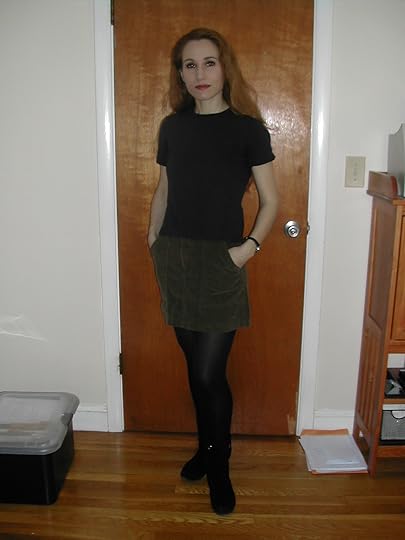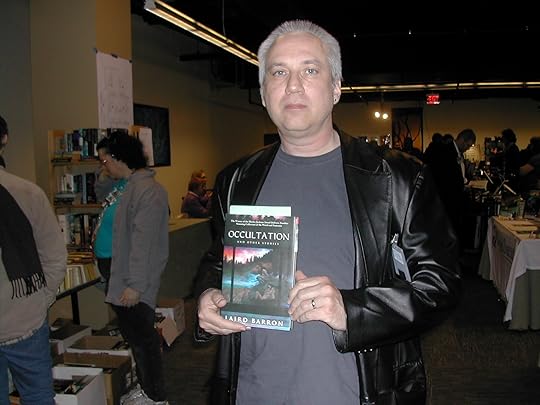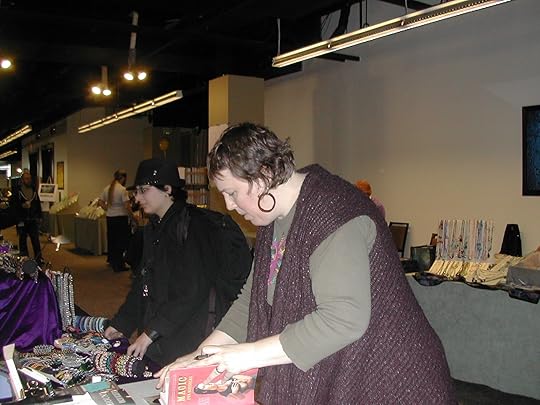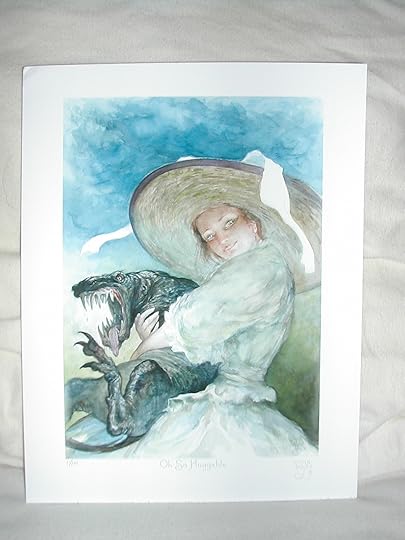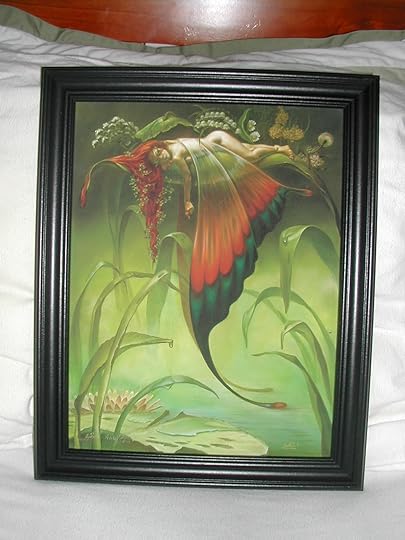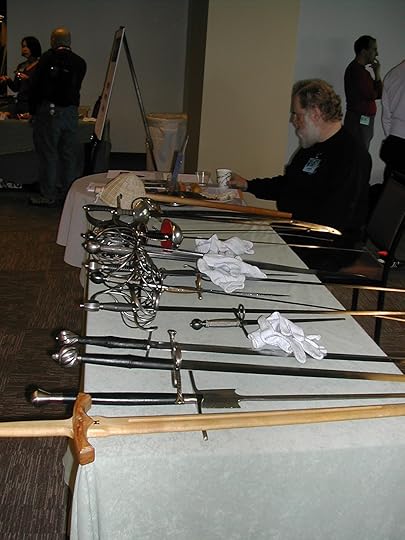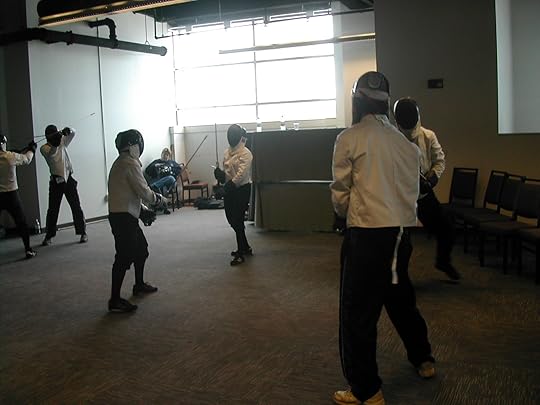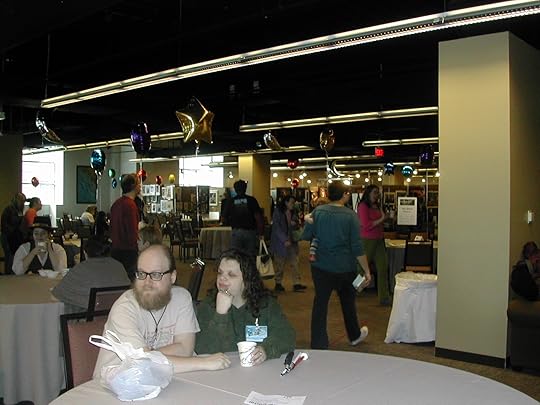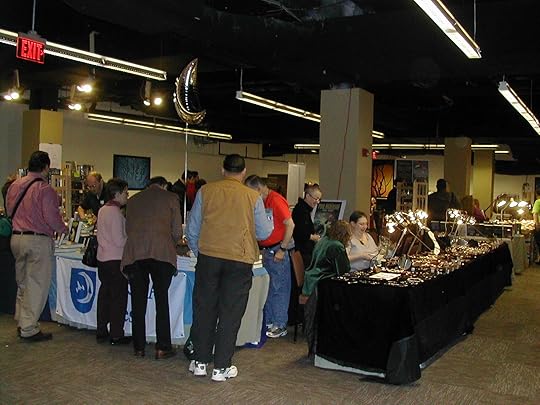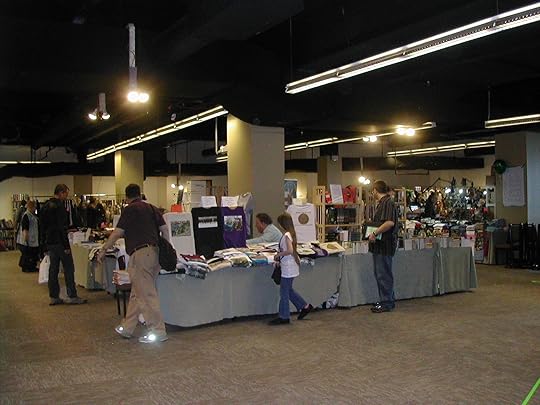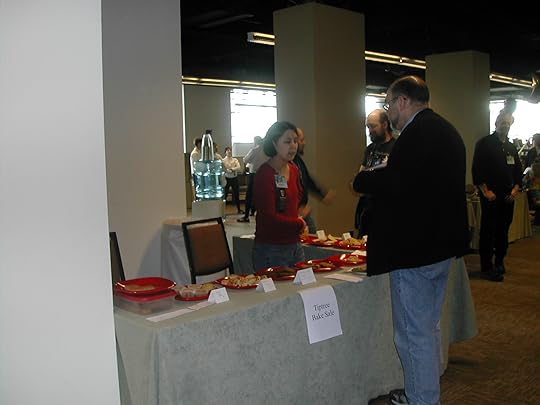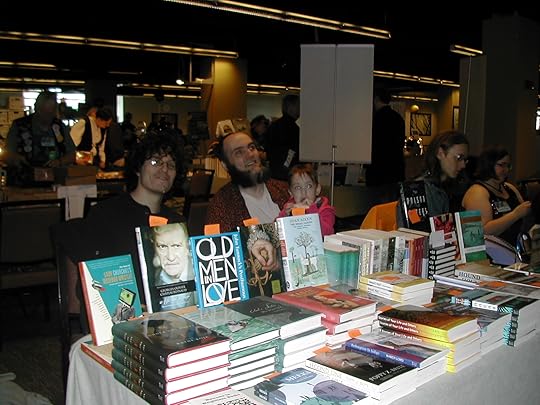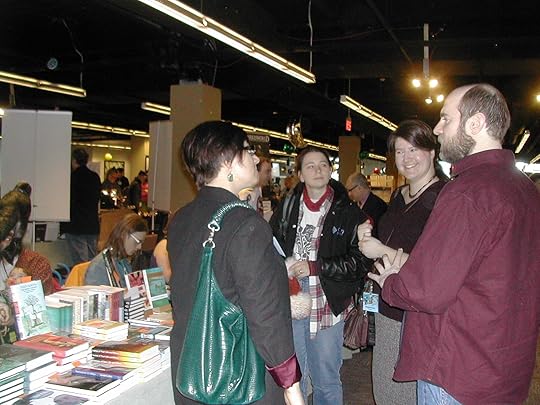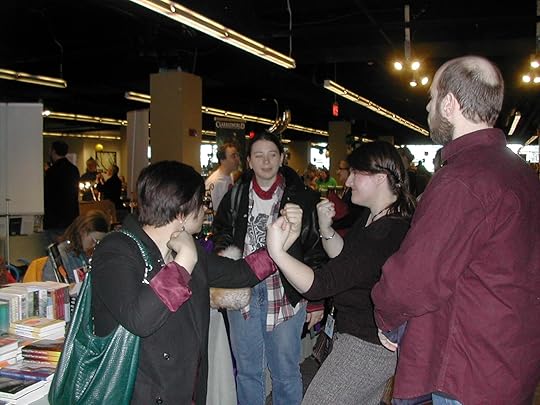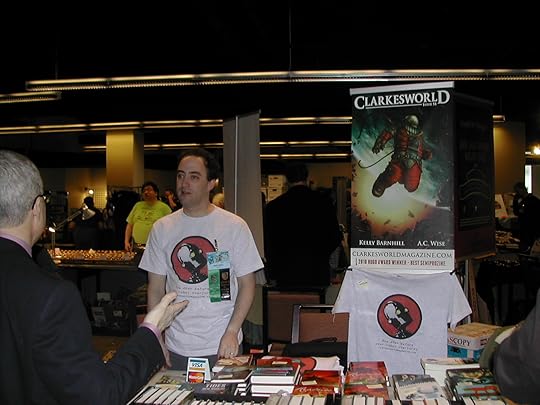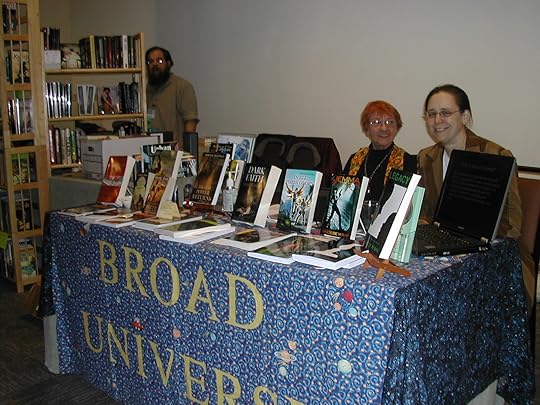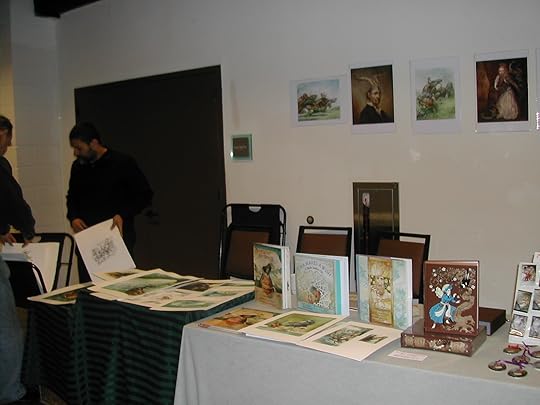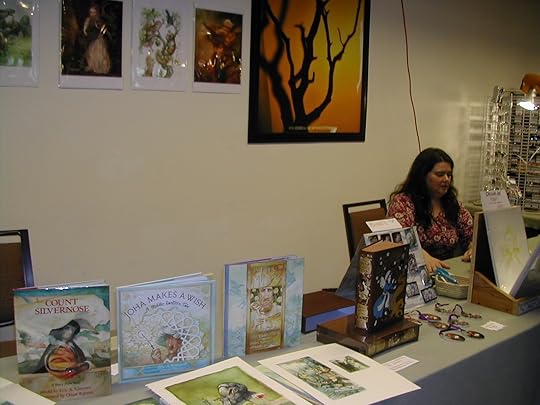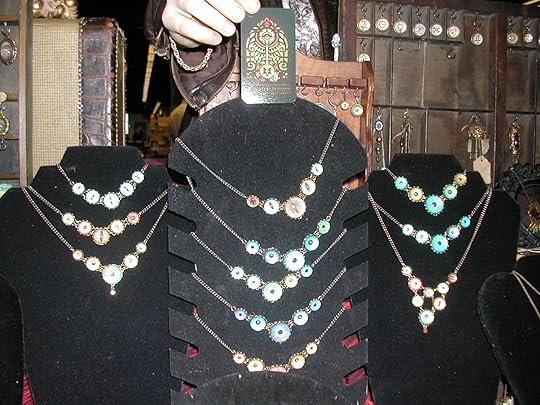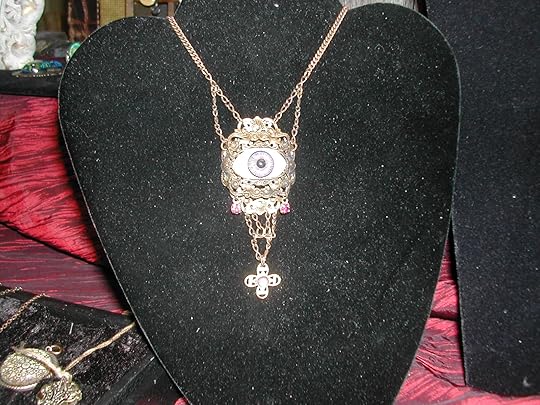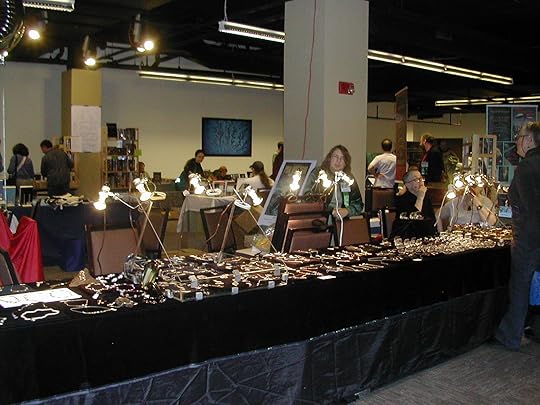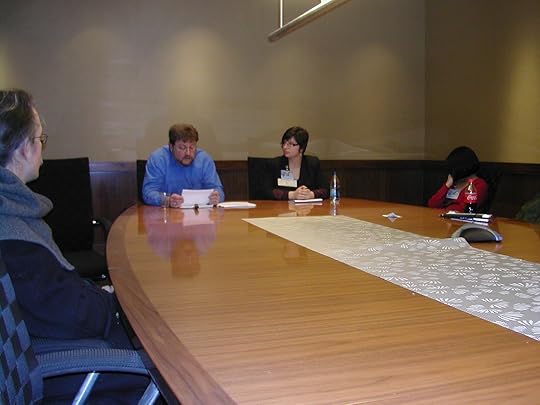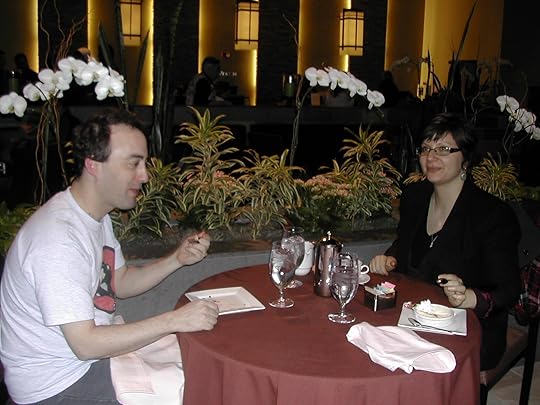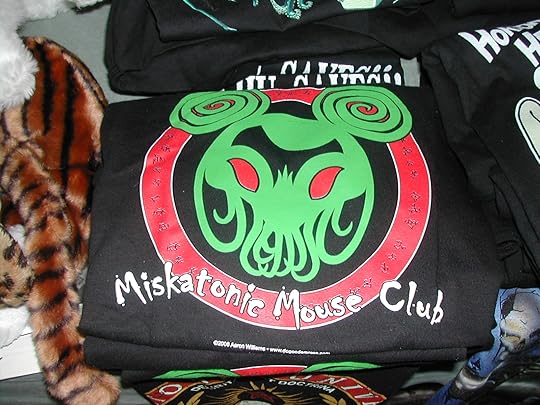Theodora Goss's Blog, page 67
February 21, 2011
On Blogging
I wanted to write a post called "Take Care of Yourself," because that's exactly what I haven't been doing lately. But Terri Windling wrote a wonderful post called "Reflections on Blogging," which was a response to an interview conducted with Rima Staines on the John Barleycorn website. You can look at the interview with Rima here: "Around the table with . . . Rima Staines." I've been blogging for a long time now, in various forms, but I've only been doing it consistently since the middle of November. (Consistently, for me, means every day. Someone else will surely have a different definition.)
And so I thought I would write about blogging, about why I do it and what it means to me.
It was the middle of November, after several weeks during which all I had wanted to do was lie on the bed and stare up at the ceiling. There I was, staring up at the ceiling, and part of me said, what now? And another part of me answered, now you remake your life.
And I got up. I spent most of that night and the next day designing this website. That's when I started blogging consistently. I think that, at its simplest, it was a way of saying several things: I am a writer. I am still here. I'm going to be fine. (Even when I wasn't sure myself that I was going to be.) It was a way of reaching out, not to anyone I knew, but to all the people I didn't know.
Since then, I've insisted on posting very day. When I miss a day, I post twice the next day. There are several reasons. First, it's a way of writing consistently. It means that every day, I sit down and write. And I get the instant gratification of seeing that my writing is read. If you want to believe you're a writer, you have to write. You have to convince yourself by actually writing. Otherwise, you begin to doubt yourself. You begin to think, I haven't written since – whenever you last wrote. And you begin to think, perhaps I'm not a writer after all. At least, that's the way I respond. This is one way to convince myself I'm a writer. And with that conviction, I will be. (The difficulty, of course, is that with the schedule I have right now, I don't have the time or energy to work on stories every day. I get stories written, but they happen in bursts, when I can focus on them completely. So I certainly am writing fiction as well, but it's happening differently. If I could work on fiction every day, I would. Also, when I write stories, I often don't know when they will be published or how many people will read them. Here, I know.)
Also, and this is a separate reason, it seems to keep me from falling into sadness or darkness, I think because I feel as though I'm connecting. And I feel as though I'm being brave, because there is something brave about writing so directly, without the intermediary of an editor, a publisher. I write it, you read it. And when I write something, it leaves me – so I write the sadness, the darkness, and then it's gone, it's out there rather than here with me.
Do you want the statistics? Now remember, I am not John Scalzi, nor was meant to be. But since I created this website in the middle of November, I've written over 100 posts and received over 300 comments. Sometime tomorrow, it will have received over 20,000 hits. I think that's pretty good, for three months!
This is a particularly personal post, and I was thinking about that: writing so personally. At Boskone, as I was walking through the dealers' area, I met a writer I always love talking to but rarely get to see, and she mentioned how difficult it could be, writing through depression. For a moment I wondered why, and then I remembered that I had written a number of posts about Depression, Anxiety, and Insomnia. It reminded me of what Hawthorne had said about autobiographical writing at the beginning of "The Custom-House":
"The truth seems to be, however, that when he casts his leaves forth upon the wind, the author addresses, not the many who will fling aside his volume, or never take it up, but the few who will understand him better than most of his schoolmates or lifemates. Some authors, indeed, do far more than this, and indulge themselves in such confidential depths of revelation as could fittingly be addressed only and exclusively to the one heart and mind of perfect sympathy; as if the printed book, thrown at large on the wide world, were certain to find out the divided segment of the writer's own nature, and complete his circle of existence by bringing him into communion with it. It is scarcely decorous, however, to speak all, even where we speak impersonally. But, as thoughts are frozen and utterance benumbed, unless the speaker stand in some true relation with his audience, it may be pardonable to imagine that a friend, a kind and apprehensive, though not the closest friend, is listening to our talk; and then, a native reserve being thawed by this genial consciousness, we may prate of the circumstances that lie around us, and even of ourself, but still keep the inmost Me behind its veil."
I don't think I'm indulging in "such confidential depths of revelation as could fittingly be addressed only and exclusively to the one heart and mind of perfect sympathy." I don't quite go that far! (Although it is a lovely idea, isn't it? The one heart and mind, the perfect sympathy.) Rather, I address what I write here to what I assume are hearts and minds of partial sympathy. I assume that you will read and understand, that we are in some way deeply and fundamentally alike, because otherwise why would you come here? I assume that we have something in common, although you may well disagree with any specific thing I say. (After all, that's what comments are for.) So I think, and hope, that we do stand in some true relation to one another, that there is something authentic about this, me writing, you reading and perhaps commenting. That this blogging, which can seem like a strange activity, has a purpose and a reward.
That is why I prate of the circumstances that lie around me, and even of myself, although I do keep the inmost Me behind a veil, not because I intend to, but because that Me is behind a veil to me too. There are parts of myself I do not understand, and I suspect that I reveal them as much in my writing as anywhere.
I have now written over 1000 words, so I'm going to stop.
But you know what I think? I think that if Hawthorne were alive now, he would be blogging. He would want that connection too.








February 20, 2011
Being a Snail
Would you believe me if I said that I was an introvert? Well, I am.
The truth is that most writers are, however much we go to conventions and live public lives, by which I mean lives that are, in significant part, lived online. I mean, if you were following my tweets, you knew what I was doing today, which was going to panels and giving a reading at Boskone. Even if you weren't following my tweets, you could see all that information on my public Twitter page.
And yet, I'm an intensely private person, and I still have to mentally prepare myself for public events. Especially ones I'm doing alone, like readings. To be perfectly honest, I'm always worried that no one will come. (After all, why would they want to come and listen to me? Aren't there so many more interesting people to listen to? So runs the mental script.)
I'm naturally a snail, and there is a process of mental bracing whenever I have to come out of my shell.
I do have one principle that helps, which I will call the Miniskirt Principle. If you have to do something frightening, do something else that frightens you at the same time. I have no idea why that helps, but it does. That is why, today, I decided to wear a miniskirt. There was something comforting about the dress I wore to Boskone on Saturday. I was Pre-Raphaelite Girl, and it floated around me, and there was nothing about it that worried me or made me self-conscious at all. But when I wear a miniskirt (and I rarely do), I'm always conscious of how I'm moving. And sitting, of course. Partly because it's just, you know, short. But partly because, like every woman, I have a least favorite part of my body, and that least favorite part is my legs. I naturally have the sort of body that makes someone a good gymnast or dancer, and I did actually take both gymnastics and dance as a child. Which means that my center of gravity is low, and I have proportionally short, muscular legs. They're perfectly functional legs that routinely take me up five flights of stairs, for which I'm grateful. It's just that, if I'm self-conscious about anything, it's them.
It's as though, by choosing to wear a miniskirt, I announce to myself and the world that I am FIERCE. And then I stride along fiercely, and I go to my panels fiercely, and do my reading fiercely. So there you are, the Miniskirt Principle: if you're frightened of doing something, do something else that frightens you at the same time.
Here is a photograph of me in a miniskirt, ready to go to the convention. (But notice that I'm artfully standing so as to minimize my legs. I'm FIERCE, but I've learned how to pose for photographs . . .)
So how did the reading go? I think it went very well. I was worried that no one would come, so this morning I tweeted that the first five people who came would get free copies of my short story collection. I had the largest crowd I've ever had for Boskone, although I don't know if that was why. And I had a chance to catch up with Brett Cox and Alex Irvine, who both came. I read part of "Pug," which is coming out in Asimov's this summer.
I also had two panels today.
First panel: Mythpunk
Debra Doyle
Gregory Feeley
Greer Gilman
Theodora Goss
Michael Swanwick
Wikipedia says, "Described as a subgenre of mythic fiction, Catherynne M. Valente uses the term "mythpunk" to define a brand of speculative fiction which starts in folklore and myth and adds elements of postmodern fantastic techniques: urban fantasy, confessional poetry, nonlinear storytelling, linguistic calisthenics, worldbuilding, and academic fantasy. Writers whose works would fall under the mythpunk label are Valente, Ekaterina Sedia, Theodora Goss, and Sonya Taaffe." And what do WE say?
This is a difficult panel to describe. So many things were said, and some of them were "The Wasteland" and "Cyberpunk," so you can get a sense of the territory that was covered. I particularly liked two lines of Michael Swanwick's: "I'm Michael Swanwick and I'm one of the most interesting fantasists writing today," and "I sit here vindicated."
He also, in the nicest and most supportive possible way, called the Mythpunks "Young Madwomen," which I think is a wonderful designation that should immediately be adopted. We should have a sort of Young Madwomen's Club.
We also talked about modernism and postmodernism. Greer said, "The impulse of modernism is to make cathedrals," and Greg added that postmodernism capers in the ruins of those cathedrals. Which I thought was an excellent description.
Perhaps the most interesting thing about this panel was telling Greer how incredibly influential she had been among the female fantasy writers of my generation, and having her look completely surprised. So this is for you, Greer Gilman and Carol Emshwiller and Kelly Link: you influenced an entire generation of women fantasy writers. (Although Kelly is actually part of our generation. But she started earlier than most of us.) You showed us what we could do, how we could write, and we found it incredibly liberating. Now you know!
Second panel: A Child's Garden of Dystopias – the Boom in Nasty Worlds for Children
Bruce Coville
Theodora Goss
Jack M. Haringa (M)
Kelly Link
Why do dystopias and YA literature seem to go together? Are YA dystopias more common now than previously? Are there differences between YA and adult dystopias – perhaps a different ratio of cynicism to hope? How does "if this goes on" fit in?
By the time I got to my last panel, I was very, very tired. Also, I knew less about this subject than any of the other subjects I had talked about. I thought it was a very good panel, and I particularly liked Kelly's image of dystopic YA novels as scratchboards: they look black, but once you scratch the surface, all the colors are underneath. And I think Bruce Coville had an important point about the fact that teens today are going through a sort of spiritual crisis, trying to figure out where meaning is going to come from in their lives while living in a culture that defines them as consumers. I think that's very true.
I had some time after the final panel to make my rounds and say goodbye. Here are Brett Cox and Kelly Link, in the general area of the Small Beer Press table:
I also had a chance to catch up with Steve Pasechnik, who helped me pick up my art. I always buy some art at Boskone, because it has one of the best art shows. I bought two limited edition prints by Omar Rayyan, "Acorn Brandy" and "Oh So Huggable."
I also had a chance to look at the pile of original paintings and drawings on his table. They were stunning, as always. But I'm grateful that he has prints available, because those are what I can afford. There is something so democratic about prints. They're different from originals, of course – there's a different feel to them. But they do allow me to surround myself with beautiful things. Like drunken squirrels!
I also bought another limited edition print by bidding on it in the art show. It's called "By the Pond" and it's by an artist named Lubov. This isn't the sort of art I usually buy, but I loved the colors, and the precision of the flowers and leaves.
To photograph these paintings, I just propped them up against a pillow. If you want to see better images, look here: "Acorn Brandy," "By the Pond." (I haven't found an image of "Oh So Huggable.")
(Note to the artists: my understanding is that, because I've purchased these items, I can photograph them and post the photographs on this website. But if you would prefer that I take them down, I will of course do so.)
The convention is over, and it's time for me to go back to work. I'm so glad I went, and also very tired. Time for the snail to crawl back into her shell for a while. (Even though at this point, it's a rather public shell.)








February 19, 2011
Boskone Pictures
All right, here are my Boskone pictures from Saturday. There are quite a lot of them, so I've put them together in pairs to save space.
The first two are of me dressed for the convention and a display of weapons by the Higgins Armory Museum. Someone complimented me on this dress, and I said that I had bought it at the thrift shop where all the Pre-Raphaelite models bought their clothes.
Here is one of the demonstrations put on by the Higgins Armory Museum, as well as a general shot of the room where all sorts of events took place. There were tables where people could sit and snacks of various sorts.
This was the dealer's area. There are not as many booksellers at Boskone as I'm used to from Wiscon or Readercon, but there are all sorts of other things, jewelry and scarves and of course art. (The actual art gallery was in a separate area that I did not photograph because of copyright issue. I don't want to reproduce the work of any artist without permission.)
I bought an oat cake at the Tiptree Bake Sale and then went over to the Small Beer Press table. Here you see Gavin Grant, his daughter Ursula, and Michael DeLuca.
Genevieve Valentine was talking to some friends in front of the Small Beer Press table. Unfortunately, a fight broke out.
Here are the Clarkesworld table with Neil Clarke and the Broad Universe table with Elaine Isaak. (Elaine is a fellow Odyssey graduate, although she attended a few years before I did.)
One of my favorite tables is always Omar and Sheila Rayyan's. Their art is stunningly beautiful. I have several of their prints, and even an original drawing that I bought last year. (It was a serious splurge.) Sheila kindly gave me permission to photograph.
A new artist this year was Kelly M. Kotulak, who makes jewelry that has a recurring theme of eyes and keys. I found it fascinating. I asked for her card, and she gave me one for Studio Hibernacula. Visit her site: it really is gorgeous.
The necklace on the left is one of Kelly Kotulak's. The table on the right is Laurie Edison's. If you've been to any of the major conventions, you've seen Laurie's stunningly beautiful jewelry, based on natural forms.
I went to a joint reading by John Langan and Genevieve Valentine, and later in the day I went to dinner with them and a group of friends. We went to a Mexican restaurant that had opened recently, and was located reasonably close to the convention hotel. After dinner, Genevieve, Neil Clarke, and I went back to the hotel for coffee and dessert. Genevieve and I shared a crème brûlée. And then it was time for me to go home. The only problem with living so close to a convention is that I can't justify the expense of staying at the convention hotel, so I have to go home every night, missing the parties. But that's all right. There will be plenty of parties at ICFA, Wiscon, and Readercon.
And finally, I think these t-shirts prove exactly what I said in the H.P. Lovecraft panel. Cthulhu is everywhere. We've domesticated him. Just wait until he wakes up and finds out that people are knitting him and putting him on t-shirts. He's going to be seriously upset.








Boskone Panels
Do you want to hear about the panels first, or look at pictures first? Why don't I give you a few brief comments on the panels, and then the pictures? That makes sense.
First Panel: The Writer's Child
Katherine Crighton
Theodora Goss
Jo Walton (M)
Jane Yolen
What's it like for a writer to raise a kid? Our panel includes both writers and people who were (and are) writers' children. Are the writer's child-rearing methods, biases, or hopes different from those of other parents? How is a writer's child different from a reader's child? Stories will be told.
I didn't know how this would go, but it was actually fascinating. Jane Yolen and Katherine Crighton both came from families where the parents were writers, and their experiences growing up were so different from mine! I said that my parents were anti-writers, both doctors who assumed that one naturally went into a profession like medicine, law, or business. This led to one of my favorite lines from this panel, which actually came from me. (I'm never the one with the good lines. This one was an exception.) I said they told me I could always do writing on the side – like salad dressing.
Jo Walton pointed out that the panel was all women, which was of course true. I wonder why? I'm sure it wasn't intentional on the part of the programming planners. But still, it's interesting that a panel about children would have all female panelists.
I was particularly fascinated by Jane's account of writing with her children. She had to separate out the mother and the writer, and they in turn had to become used to challenging her, to being effective editors. Jo also said that she got ideas from her son. I wonder if Ophelia and I will ever work on anything together? Of course, she's already writing her own stories, putting together her own books.
Second Panel: Writer vs. Copyeditor – Lovefest or Deathmatch?
Theodora Goss
Teresa Nielsen Hayden (M)
Jo Walton
Let's discuss process and roles, how copyeditors can help, when they can go too far, points of contention, and more. Red pens may be flourished, but let's hope not blood-red . . .
Another panelist had been added to this panel, but I'm afraid I don't remember her name. I should have written it down. This was incredibly useful. Theresa Nielsen Hayden provided so much information on the editor's perspective, and told a number of stories about when copyediting had gone well or badly. I particularly liked the one about the copyeditor for a collection of modern classics who "corrected" Faulkner's punctuation.
She also talked about copyeditors having a superpower, which I think is true. The audience quickly decided to call it hypereulexia.
Third Panel: Fairy Tales into Fantasy
Greer Gilman
Theodora Goss (M)
Jack M. Haringa
Jane Yolen
A whole branch of fantasy literature is based on re-examining the assumptions of well-known fairy tales. Panelists discuss some of the best examples.
I moderated this panel. Just so you know, if you have Jane Yolen, Greer Gilman, and Jack Haringa on a panel, don't worry about preparing. They're all brilliant and they all just talk. Brilliantly. This panel was such a pleasure, because the topic itself has come up so often before in convention panels, but I think Jane, Greer, and Jack made it fresh and interesting.
(Fangirl moment: I was on two panels with Jane Yolen! There was a time when I would barely have dared talk to her! I mean, I grew up on Jane Yolen . . .)
My favorite lines in this panel both came from Greer, who always seems to come up with the most wonderful zingers. Here they are:
Greer saying that fantasy needs to have its roots in the folkroot tradition, which serves as a sort of soil, giving it the necessary nutrients: "I for one do not believe in hydroponic literature."
Greer on Hans Christian Andersen's"The Little Mermaid": "It's Titus Andronicus with fish."
All right, now to the pictures. But I'm going to have to post them separately, because there are a number of them. So, on to the next post.








February 18, 2011
Conventions
On Fridays I usually try to write part of my story, but I spent this evening at Boskone, so I'm going to write about that.
This morning I woke up at seven, got dressed, and went to the university to meet with students. I met with students all morning, then taught for three hours, then met with more students. Then I took the T, green line to red line to silver line, across the city to Boskone. I was on one panel and talked to many people, and now it's midnight and I'm tired, so I'll do my best to make this post coherent.
Why do I go to conventions? I suppose the most practical reason is that when I go to conventions, people get to know who I am. And then they look at my blog, and perhaps they read my books, so going to conventions is simply part of what I do as a writer. Today I was on a panel on H.P. Lovecraft with Charles Stross, John Langan, and Jack Haringa. I thought it went well . John was an excellent moderator, I thought Charles and Jack and I all made interesting points, and there were very interesting points from the audience as well. Charles brought several Cthulthuesque visual aids.
Before the panel I had wandered around the dealer's room. Omar Rayyan was there, and I know I'll have to at least buy an Omar Rayyan print at some point during the convention. I talked to Gavin Grant, who was at the Small Beer Press table. Gavin was kind enough to give me a copy of Joan Aiken: The Serial Garden, and I bought a copy of Holly Black's The Poison Eaters. I saw some other wonderful things that I'll try to write about tomorrow. I'll try to post some pictures too. A less practical reason for going to conventions is seeing all the things that people are creating. Beautiful books, beautiful art. The art show this year is particularly good.
I ran into or had short conversations with several people I knew or had at least met before: Sarah Langan and her husband J.T. Petty, Laird Barron, Paul Tremblay. And I have a long talk with Genevieve Valentine, with whom I shared some dinner and a dessert. (We did the girl thing: shared food. If you share food, you don't have to feel guilty about what you're eating. Although honestly, the dessert was such a large slice of chocolate cake, and so much of that cake was frosting, dense and chocolaty and flavored with Guiness, that we only ate about half of it. Even with sharing.)
A third reason for going to conventions is meeting friends. We all live in different places, all over the country, and conventions give us the opportunity to see each other again, to catch up.
A fourth reason is the shop. Every profession talks shop. Writers do too: writer shop is about who's working on what, who has a book coming out, what sorts of projects are floating around. Who's good to work with, how books were sold, what problems are coming up. I get so much information simply from talking shop with other writers. We all develop a sort of knowledge, a general sense for how things are working, what the industry is doing. And that's absolutely crucial in an industry like this one, where there's no central source of information (except perhaps Locus Magazine). You have to talk to people to, basically, know what's going on. To keep up.
If you don't do that, don't keep up with the industry, you're going to run into problems. You're going to sign with a publisher who hasn't been paying writers, or not understand how to promote your own writing, or miss opportunities. And if you want to be a professional writer, to do this at the most serious level, you can't afford to do that, any more than a businessman can afford not to keep up with the stock market, or a lawyer can afford to ignore the latest cases.
What do conventions give me? Information, connection, pleasure. That's why I go to conventions.
I'll be at Boskone on Saturday and Sunday as well. Hopefully on those days I won't be quite so tired, and will be able to put together more coherent posts. But what I really want to say is, as I rode the T toward the convention hotel, I felt a sense of freedom and joy, that I was going to be spending time with my crowd. That I was going to see friends again, and be with people who cared about books and art. People who made things. Who are my favorite sorts of people.








February 17, 2011
Go Tonight
I asked Terri Windling if I could write about a poem she had written called "The Night Journey," and she very kindly told me that I could. It's one of my favorite poems. She gave me permission not only to quote from it, but to reprint it here, so after my analysis you'll find the whole poem reprinted below.
It begins,
"Go by coombe, by candle light,
by moonlight, starlight, stepping stone,
and step o'er bracken, branches, briars,
and go tonight, and go alone . . ."
A coombe is a kind of deep, narrow valley, says the dictionary. So follow the valley, whether by candle light, moonlight, or starlight (meaning, whether or not you have a candle I suppose, but whatever you have, you must follow). It's going to be a wild sort of valley, with bracken and branches to step over, even briars that might tear your dress. And go tonight, not another night. And go alone, because this sort of journey can only be taken alone.
" . . . go by water, go by willow,
go by ivy, oak and ash,
and rowan berries red as blood,
and breadcrumbs, stones, to mark the path;
find the way by water's whisper,
water rising from a womb
of granite, peat, of summer heat,
to slake your thirst and fill the coombe
and tumble over moss and stone
and feed the roots of ancient trees
and call to you: go, now, tonight,
by water, earth, phyllomancy . . ."
Phyllomancy is a means of divination using leaves. So what are you following on your journey? You have particular markers: water, trees, berries. Breadcrumbs and stones also mark the path, which means that others travelers have followed that path before. Drink from the water that seems to spring up from the earth and then runs along the bottom of the coombe. The water is calling to you, but I suspect that more than the water is calling – everything is calling, the trees, the stones. You can see what is written in the leaves, you have already left your home and been granted certain powers. You are already a seer.
" . . . by candle flame, by spirit-name,
by spells, by portents, myth and song,
by drum beat, heart beat, earth pulsing
beneath your feet, calling you home,
calling you back, calling you through
the water, wood, the waste, the wild,
the hills where Dartmoor ponies pass,
and black-faced sheep, a spectral child,
a fox with pale unnatural eyes,
an owl, a badger, ghostly deer
with horns of star light, candle light
to guide the way, to lead you here . . ."
You are following the breadcrumbs, but also the stories – the portents, the myths, the songs, all the things you have been told all your life that are telling you where to go. The spirit-name: is that yours? The spells: are they spells you have woven? The heartbeat. I am certain it is yours, that you are following the beating of your own heart. But there is also a drumbeat, a pulsing that comes from somewhere – or someone? And from the earth itself, whose heart is pulsing with yours? Until earth and heart and drum are simply one pulse, one beat.
And they are calling you home, back to the home you left so long ago, but where you have realized you belong after all. It's not where you expected, is it? It's in the wood, the waste, the wild. Where the dead walk, where the animals are ready to speak with you and to lead you as well, animals that are not simply animals but also your kith and kin and kind.
" . . . to lead you to the one who waits,
who sits and waits upon the tor,
he waits and watches, wondering
if you're the one he's waiting for . . ."
Are you? Do you think you are? You're the one who heard and answered the call, so that must mean something. You're the one who came, who wants to be worthy. A tor, by the way, is a high hill or pile of stones. And now you're standing in front of him, because you've heard the call and you want to be the one. And you're waiting. Hoping you are the one he's been calling, because this is a call you've heard all your life. And tonight you decided to answer it.
" . . . he waits by dawn, by dusk, by dark,
by sun, by rain, by day, by night,
his hair as black as ravens' wings,
his eyes of amber, skin milk white,
his skin tattooed with spiral lines
beneath a mask of wood and leaves
and polished stone and sun-bleached bone,
beneath a shirt of spiders' weave,
his wrists weighted with silver bands
and copper braids tarnished to green,
he waits for you, unknown and yet
familiar from forgotten dreams . . ."
Who is he? I think he is an image of the one who is always calling. Several years ago, I wrote a book about three women poets, and I noticed that all of them had a poem about the call – a stranger came and called, or there was a call from some unspecified source. And they had to follow, whatever the price. (It was usually an ordinary woman's life. Comfort, a home. But they always followed the call.) It is a very old call. It has been calling for a very long time, as long as there have been singers and storytellers and painters on cavern walls.
" . . . you dream and stir upon your bed
and toss and turn among the sheets,
the wind taps at the window glass
and water tumbles through the leat
and through the garden, through the wood,
and over moss and over stone
and tells you: go, by candle light,
and go tonight, and go alone . . ."
Wait, weren't you on the hillside? No, you're still in bed, still not risen. Dreaming about the call. You haven't yet made the decision to go out into the darkness.
" . . . he's sent you dreams, he's left you signs,
he's left you feathers, beads and runes,
so go, tonight, by candle light,
by ash and oak, by wood, by coombe."
But he's calling you to whatever it is you're supposed to do, whatever it is you're supposed to be. It's your choice now. Are you going to rise in your nightdress, not even stopping to change? Are you going to take the candle and go? Are you going to follow the narrow valley, drink from the spring that runs through it, use all the powers you have ever had, all the training you have ever received, to read the signs and follow?
Or are you going to turn over, fall into a deeper sleep?
No, I didn't think so.
I have no idea if this is how Terri would read her own poem, but it's what the poem means to me. Here it is in its entirety: (Read it again. What does it mean to you?)
The Night Journey
by Terri Windling
Go by coombe, by candle light,
by moonlight, starlight, stepping stone,
and step o'er bracken, branches, briars,
and go tonight, and go alone,
go by water, go by willow,
go by ivy, oak and ash,
and rowan berries red as blood,
and breadcrumbs, stones, to mark the path;
find the way by water's whisper,
water rising from a womb
of granite, peat, of summer heat,
to slake your thirst and fill the coombe
and tumble over moss and stone
and feed the roots of ancient trees
and call to you: go, now, tonight,
by water, earth, phyllomancy,
by candle flame, by spirit-name,
by spells, by portents, myth and song,
by drum beat, heart beat, earth pulsing
beneath your feet, calling you home,
calling you back, calling you through
the water, wood, the waste, the wild,
the hills where Dartmoor ponies pass,
and black-faced sheep, a spectral child,
a fox with pale unnatural eyes,
an owl, a badger, ghostly deer
with horns of star light, candle light
to guide the way, to lead you here,
to lead you to the one who waits,
who sits and waits upon the tor,
he waits and watches, wondering
if you're the one he's waiting for;
he waits by dawn, by dusk, by dark,
by sun, by rain, by day, by night,
his hair as black as ravens' wings,
his eyes of amber, skin milk white,
his skin tattooed with spiral lines
beneath a mask of wood and leaves
and polished stone and sun-bleached bone,
beneath a shirt of spiders' weave,
his wrists weighted with silver bands
and copper braids tarnished to green,
he waits for you, unknown and yet
familiar from forgotten dreams;
you dream and stir upon your bed
and toss and turn among the sheets,
the wind taps at the window glass
and water tumbles through the leat
and through the garden, through the wood,
and over moss and over stone
and tells you: go, by candle light,
and go tonight, and go alone;
he's sent you dreams, he's left you signs,
he's left you feathers, beads and runes,
so go, tonight, by candle light,
by ash and oak, by wood, by coombe.
This poem is reprinted, with Terri's kind permission, from The Journal of Mythic Arts.








Writing Tired
What is it with this week?
I was so tired earlier in the week, and now I'm most definitely sick. But it's a sort of low-level sickness, a sense that things aren't right with me: tiredness, achiness, my head not quite clear.
Yesterday I came home from the university, lay down to rest for a few minutes, and woke up three hours later. And then I could not get to sleep again until very late, and tossed and turned all night.
I did not write my blog post.
(You know that I've committed to writing a blog post a day. So when I woke up this morning, an hour earlier than I usually do, I made myself breakfast and decided to write yesterday's post. Here I am, with oatmeal and orange juice, doing just that.)
My blog post today is about the difficulty of writing when you're tired. I have two examples for you. Take a look at my blog post "The School Itself." That's writing while tired. It's rambling and, to be perfectly honest, I'm not being particularly original, am I? I mean, there I am, trying to describe a witch's school, and I'm not coming up with interesting imagery. If it were a story and I had time to revise, I would have revised almost completely. Made things a lot more interesting. But that day, I just couldn't come up with anything.
My second example is "The Haul." I was tired that day too, and all I could do was give you photographs.
The question is, what do you do on days like those? The answer, for me, is not to take a break from writing. I suppose for many people it would be, and perhaps it ought to be for me as well. But then, on top of not feeling physically well, I would have the not-well feeling of not having written. So instead, I write tired. I'm tired, I go ahead and write. And whatever comes out, comes out.
(Can you see the effect in this post? My sentences are shorter, the transitions between them more choppy. It's as though my brain is having difficulty seeing connections, knowing where I should go.)
On a blog, there is no chance to go back and revise, so what comes out is what you get. And in a way that may be unfair, because you're not exactly getting the best of me. On the other hand, you are getting an accurate representation of who I am as a writer. There are days when I'm writing tired, and that's the best I can do. If there were time to revise, I would.
Today is going to be a long day for me. I have conferences all day long, and then I have work to do after I come home. I think that's why I'm sick, to be honest: it's a combination of stress, too much work, and the fact that I have fifty-six students this semester. When they get sick, I get sick.
So I will get through the day, come home, and probably fall asleep again as I did yesterday. And maybe wake up and write my blog post. I have a whole list of blog posts that I've been wanting to write, but I've been too tired to write them. I'll give you some of the titles:
"Go Tonight" about one of my favorite poems by Terri Windling,
"A Thousand Words" about writing a thousand words a day,
"Swan" about a story for a silent movie or comic book,
"The Romantic Underground" about a literary non-movement,
"Care for Yourself" about taking care of yourself as a writer,
"The Writer's Cat" about Cordelia, plague of my life and paper-eater.
I hope I get to them . . .
Time to go start my day. It's going to be a long one.








February 15, 2011
Value Yourself
Once, I had a student who started the semester by telling me that she was a terrible writer, that she had a great deal of trouble writing. Of course I believed her, and I planned on giving her extra help – until I actually saw her papers, which were perfectly normal undergraduate papers. What I learned, during our conferences, is that she had a tendency to use what I call the "preemptive put-down." She would put herself down first, as though expecting me to put her down. As though putting herself down would somehow head off a put-down by me, or someone else, I don't know whom.
I understand the preemptive put-down because I've certainly done it myself. I'm sure you have as well. "This dress is so ugly, but it's the only thing that wasn't in the laundry basket." "It's a first draft, and it's awful – seriously. You shouldn't even look at it." "I'm terrible at public speaking," or "dancing," or "throwing knives at people blindfolded." Whatever.
The preemptive put-down is a way of putting yourself down before anyone else can. It's a way of not being hurt, only it doesn't work, does it? For two reasons. First, because you feel as bad about yourself, having just put yourself down, as you would have felt if someone else had done it. And second, because when you put yourself down, other people tend to look at you strangely, to start wondering if in fact the dress is ugly, the story is awful, you're terrible at public speaking (in which case why are you on the panel anyway?).
So much of what we think of as reality is perception. There's real reality – like rocks, and if you don't think rocks are real, try kicking one. Then there's perception – Google stock is worth buying, that woman is beautiful, that speaker sounds smart. And perception can be influenced (unlike rocks).
Motivational speakers know this, and it's part of how they make their living: people tend to take you at your own valuation. If you ask for things and believe you deserve them, you get them with surprising frequency.
So you must, must, must value yourself.
But we don't, do we? There are several reasons, but perhaps the most frequent one is that we were taught not to as children. Because no one wants children to be "spoiled." That was a kind of mantra when I was growing up – that my brother and I were spoiled American children. We didn't know what it had been like, how difficult it had been, in Hungary under the communists. And of course we didn't. We were just trying to get on with our American lives. I've seen that attitude in a variety of settings, and I think it's partly cultural. Once, at a playground, I saw an older woman who was obviously Eastern European lean over and say, to an American mother who was playing with her daughter, "She's a little spoiled, isn't she?" As though it were the most natural thing in the world. In the South, there's a saying: you're not supposed to get above your raisin'. (Which makes me wonder, is this an aspect of cultures for which defeat still rankles? This concerted attempt to keep its children down?)
I think this sort of message has a terrible effect. I did not receive it as strongly as many others do, but I remember times in my life when I did not try something because I simply assumed that I would not be good enough, that I did not deserve whatever it was – the scholarship, the prize.
Here's why I bring all this up. If you're going to be a writer, you absolutely have to learn to value yourself, because writing is hard enough without the preemptive put-down. There are plenty of people out there who will put you down. Your job is to build yourself up, however many times you need to. And to get better, and better, and better through all the rejections.
Because you know what? Putting yourself down is a profoundly unattractive habit. People start to wonder if you really are as awful as you say, or if you're just asking for compliments. (If you need compliments, I recommend the following method: "I so need a compliment right now. Can you compliment me? Any kind of compliment will do." If you are with a reasonably decent person, you will get a compliment. As I mentioned, people tend to give you what you ask for.) And putting yourself down is cowardly. It's a way of making yourself safe, of hurting yourself before anyone else hurts you. Although, again as I mentioned, it doesn't actually work, does it? It doesn't make you feel safe, just sort of sad.
So how do you value yourself? It's difficult to change your mental state, but it's easy to change your actions. And changing your actions changes your mental state. So you must act as though you are valuable. You must act as though you are the best friend you've known and loved since childhood. When your best friend is sad, what do you do? Tell her how wonderful she is. When your best friend is sick, you bring her soup. You listen to her, you care about her, you buy her presents on her birthday. You draw her bubble baths. (All right, maybe not. Think of yourself as a friend even better than your best friend. After all, you were there when you were born, you will be there when you die. Who is closer to you than you are?)
If anyone insults her, you stand up for her. You never put her down or allow anyone else to do so. If she puts herself down, you tell her to stop. You tell her you won't tolerate such behavior.
And you would be honest with your best friend. If the dress really was ugly, you would tell her, you wouldn't let her wear it, you would take her shopping for another. You would certainly not stand there and insult her! You would tell her the truth and help her become the person she wants and deserves to be.
The more you learn to value yourself, the better your life will become. The more you will have the courage to change it, to make it the life you want. Valuing yourself doesn't make life easier – life is always going to be life, you know? But it allows you to participate and compete. It is your "yes" to life, your "I'm going to give speeches and dance and throws knives at people blindfolded." (After knife-throwing classes, of course.)
This is as close as I'll ever come to a rant, but I really care about this. When you're around me, don't give me the preemptive put-down, because I'll call you on it. As your friend.








February 14, 2011
Listen to Me
I was listening to a video made by some friends of mine, and I started wondering what my voice would sound like recorded. And of course since it's late and I'm tired and I have a lot of work to do, I immediately started playing around and created an MP3. And then I figured out how to upload an audio file on WordPress, which required paying $19.99 for 5 GB of space, which seemed like a pretty good deal. And then I uploaded the audio file.
Here it is, an audio file of me reading the blog post I uploaded earlier today, "Thoughts on Love":
It's only my first attempt, and I made some mistakes. For example, the first time I tried to record something, I did not use a mic, so there was a lot of background static. I erased that recording, but the second time, when I did use a mic, I adjusted my voice based on the first recording. So I think that in the second recording, which is the one above, there is too much emphasis. In places, I don't sound quite natural.
The next time I do this, and I'm sure there will be a next time now that I've learned how, I'll read more naturally, with less emphasis. But honestly, I'm fairly pleased with the recording. I think I sound all right. It's obvious that I've been trained to read out loud – and that's true, I have been. In high school, I participated in speech competitions, was the captain of the debate team, and hung out with the drama crowd. I was the Cheshire Cat in Alice in Wonderland. In college, I was president of the Washington Literary Society and Debating Union. It's also obvious that I don't have a trained voice. A professional actor would do much better, I'm sure. But I like my voice well enough, I'm comfortable enough with how the recording came out, that I'll certainly post more.
I do notice one thing that is interesting to me – and rather strange. I recognize my cadences. They are the cadences of an Episcopal minister speaking from the pulpit. I haven't been to that many church services, although when I used to go it was always to the Episcopal church. (Although I'm a devout pantheist by nature.) But somehow I must have internalized those cadences. Somehow they must have crept into my reading voice and made themselves at home there.
What will you think of this recording? I have no idea, but feel free to tell me of course.
Next stop, music videos. (All right, maybe not. I'm not Loreena McKennitt. Although I'm having so much fun that I'm sure I'll think of something else to do.)
Anyway, I hope you like the recording. This is what I sound like. Really!








Thoughts on Love
I think there are two kinds of romantic love. (I'm not talking about love in general, love for country, love for a child. Romantic love specifically.) One kind is for writing about. The other kind is the one you actually want.
The kind for writing about is the Tristan and Isolde love. It's immediate, passionate, intense. It breaks you apart and remakes you, so that you're a different person, no longer the person you were. It demands everything from you: your time, sometimes your life. It's the best thing you could ever possibly experience, until it's the worst thing you could ever possibly experience and you want to die.
That kind of love makes for fabulous stories. You can write all the intense and passionate parts, and then you can write all the painful parts. You can torture your characters all you want.
The other kind of love does not make for interesting stories. You probably have an idea of what I'm going to describe, but that idea is wrong. I don't mean the sort of domestic love that endures for years. I don't mean that at all, and I don't think that's romantic love but something else. The Tristan and Isolde love does not fade into domestic love. If it does, it wasn't the Tristan and Isolde love, which either endures or destroys itself. It can turn into hatred more easily than it can become domesticated, settle down into an ordinary life.
No, the other kind of love I'm talking about is described by Viktor Frankl, who writes,
"Love is the only way to grasp another human being in the innermost core of his personality. No one can become fully aware of the very essence of another human being unless he loves him. By his love he is enabled to see the essential traits and features in the beloved person; and even more, he sees that which is potential in him, which is not yet actualized but yet ought to be actualized. Furthermore, by his love, the loving person enables the beloved person to actualize these potentialities. By making him aware of what he can be and of what he should become, he makes these potentialities come true."
I suppose what I'm really describing are three types of love: romantic love (passionate, intense), domestic love (comfortable, a safe haven in a stormy world – Tristan and Isolde were never safe havens for each other), and this other thing for which I have no name.
Romantic love makes you feel bound to the other person. Domestic love makes you feel safe with the other person. This third thing makes you feel free and not at all safe, because it means that you are seen, truly seen, by another person. Seen not just as who you are, but as who you could be. And so this love says to you, become who you could be – I will help you, I will be there for you as you do that, but I will demand that of you, that you become the self you were meant to be.
But it also leaves you perfectly free. It's not a love that says, love me back. It's not a love that says, do your duty. It's not a love that restrains you in any way, except by asking you to become yourself.
And it's a love that sees you, not as a reflection of the one who sees, but as who you actually are.
It's a light in the darkness, by which you are seen and enabled to see.
I think I'll call it perfect love, and it's what I think we are all striving for. Romantic love feels wonderful, until it doesn't. And domestic love makes us contented, until we realized one day that we want more, that we are not being our fullest, truest selves. That we were not meant to be contented, but to be discontented, to be forever searching and striving for more. That the search and the striving make us most human. What we want is the love that calls us on through the darkness. That offers a partnership deeper and stronger than either of the others. (If Tristan and Isolde had lived, would they have found it? Would he have helped her become a poet, would she have sent him on his quests with her blessing and a kiss?)
But that sort of love doesn't make for very good stories, does it? (Although it might, just might, make for good art.)









